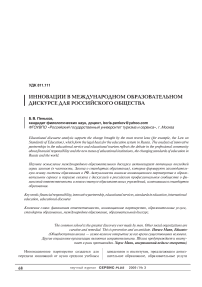Инновации в международном образовательном дискурсе для российского общества
Автор: Пеньков Б.В.
Журнал: Сервис plus @servis-plus
Рубрика: Проблемы образования и рынка труда
Статья в выпуске: 3 т.3, 2009 года.
Бесплатный доступ
Научное осмысление международного образовательного дискурса активизирует потенциал последней серии законов (в частности, Закона о стандартах образования), которые формируют законодательную основу системы образования в РФ. Актуальность анализа инновационного партнерства в образовательном сервисе и туризме связана с дискуссией в российском профессиональном сообществе о финансовой ответственности и новом статусе образовательных учреждений, изменившихся стандартов образования.
Финансовая ответственность, инновационное партнерство, образовательные услуги, стандарты образования, международное образование, образовательный дискурс
Короткий адрес: https://sciup.org/140209887
IDR: 140209887
Список литературы Инновации в международном образовательном дискурсе для российского общества
- BonaccorsiA., Cinzia Daraio (Editors) (2007). Universities and Strategic Knowledge Creation: Specialisation and Performance in Europe (Prime Series on Research and Innovation Policy in Europe). Edward Elgar Publishing. 492 p.
- Corrigan D. (2000). The changing role of schools and higher education institutions with respect to communitybased interagency collaboration and interprofessional partnerships. Peabody Journal of Education, 75(1), 176-195.
- FieldJ. (2006) Lifelong Learning and the New Educational Order. Trentham Books.
- Fiore D.J. (2002). School Community Relations. Eye on Education. 248 p.
- Geiger R. (2004). Knowledge and Money: Research Universities and the Paradox of the Marketplace. Stanford University Press. 336 p.
- Harding A., Scott A., Laske S., Burtscher C. (Editors). (2007). Bright Satanic Mills: Universities, Regional Development and the Knowledge Economy. Ashgate Publishing. 242 p.
- Hayes Ch. D. (2004). The Rapture Of Maturity: A Legacy Of Lifelong Learning. Autodidactic Press. 224 p.
- Jacoby and Associates (2003). Building Partnerships for Service Learning. Jossey-Bass. 400 p.
- Jasper M. (2006). Professional development, reflection, and decision-making. Oxford: Blackwell Publishing.
- Maurrasse D. (2001). Beyond the Campus: How Colleges and Universities Form Partnerships with their Communities. Routledge. 224 p.
- Maurrasse D. (Editor) (2004). A Future for Everyone: Innovative Social Responsibility and Community Partnerships. Routledge. 224 p.
- Mclaughlin C. (2006). Researching Schools: Stories from a schools-university partnership for educational research.
- Moore W. (2000). Community colleges and K-12 preparation.
- Percy S. L., Zimpher N. L., Brukardt M. J. (Editors) (2006). Creating aNew Kind of University: Institutionalizing CommunityUniversity Engagement. Anker Publishing Company, Inc. 288 p.
- Raschke C.A. (2002). The Digital Revolution and the Coming of the Postmodern University. RoutledgeFalmer. 144 p.
- Sandholtz, J.H. (2002). Inservice training or professional development: Contrasting opportunities in a school/university partnership. Teaching and Teacher Education, 18, 815-830.
- SilkaL., ForrantR. (2006). Inside and Out: Universities and Educationfor Sustainable Development. Baywood Publishing Company, Inc. 190 p.
- SoskaT. & Butter field Alice K. Johnson (Editor) (2005) University-community Partnerships: Universities In Civic Engagement, Routledge. 262 p.
- Slaughter S., RhoadesG. (2004). Academic Capitalism and the New Economy: Markets, State, and Higher Education. The Johns Hopkins University Press. 384 p.
- Warren, L.L., Peel H.A. (2005). Collaborative model for school reform through a rural school/university partnership. Education, 126 (2), 346-352.
- Welfens P. J. J., Ellen Walther-Klaus (Editors) (2008). Digital Excellence: University Meets Economy. Springer. 146 p.
- YusufS., NabeshimaK. (2006). How Universities Promote Economic Growth (Directions in Development). World Bank Publications. 316 p.
- Карасик В. И. Семиотика ритуального дискурса/В. И. Карасик//Коммуникативные технологии в образовании, бизнесе, политике, праве. Тезисы докладов Международной научно-практической конференции. Волгоград: Прин-Терра Дизайн, 2005. С. 76-79.
- Кашкин В. Б. Сопоставительные исследования дискурса/В. Б. Кашкин//Концептуальное пространство языка. Тамбов: ТГУ, 2005. С. 337-353.


